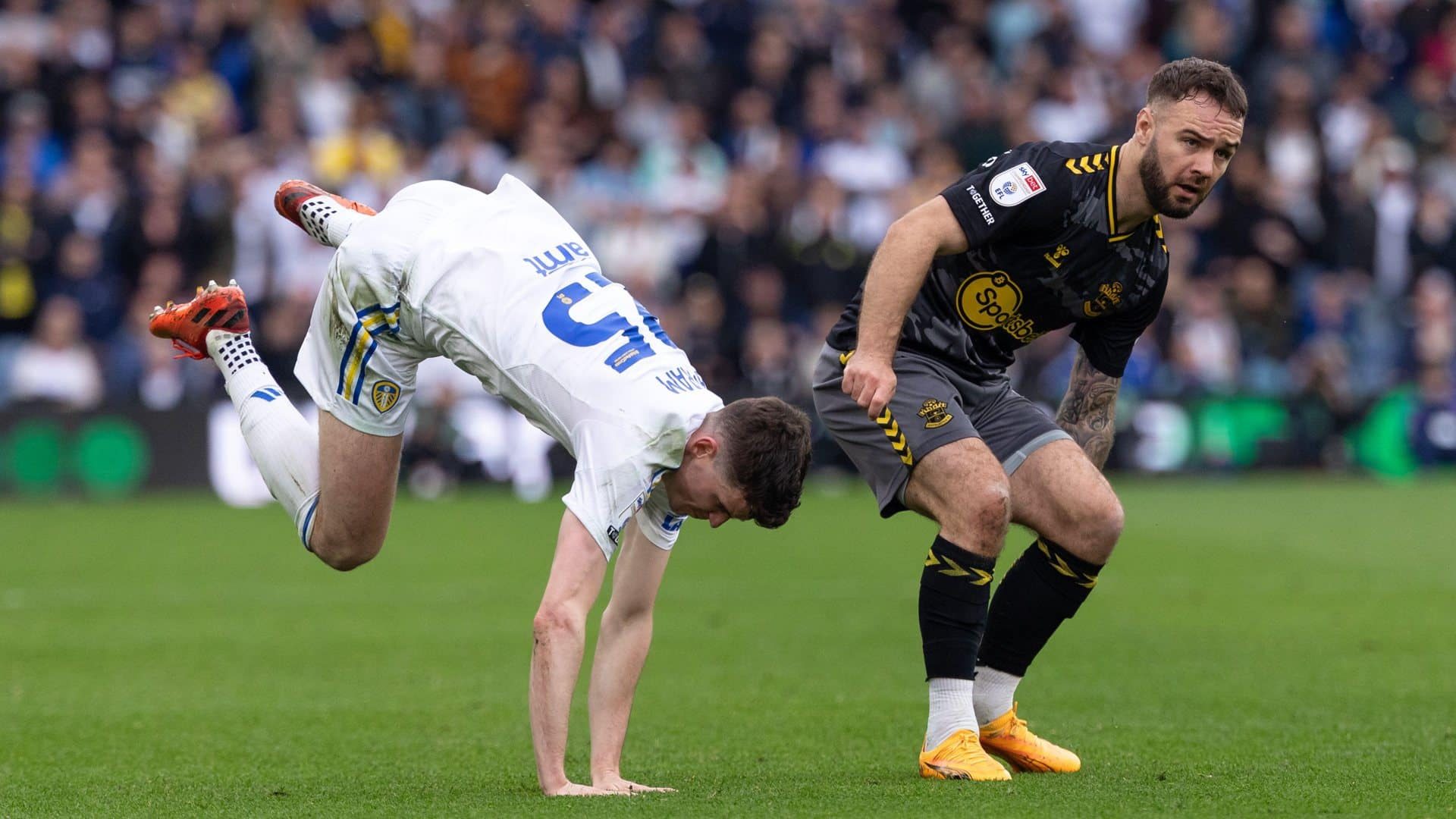
Losing to Southampton on Saturday was an awkward and tetchy way to end the regular season, on an afternoon when Daniel Farke couldn’t really win. The remaining chance of automatic promotion was slim, but giving up on that chance was unthinkable. Leeds United could have been forgiven for taking it easy, giving some players a rest, playing without the pressure that seems to have been getting them down. But then, if Huddersfield had beaten Ipswich while Farke was giving the youth team a run out, he would never have been forgiven.
So Saturday had to be different, if only to keep the players interested. Farke gave things away slightly in his post-match press conference, when he was asked how he was feeling. “I’m a bit tired,” he said, “because this week was not the easiest one. In order to lift the players up and make them believe there is a chance and to go for it, and to convince them to play man against man in order to go for this game, was an exhausting week.” He might have been more exhausted again by the reaction after he said he’d taken “a really risky approach” to the game, trying a “wild style of football”, if he’d seen how few fans believed him.
This season at Leeds has not been synonymous with a “wild style of football” and there wasn’t much surface evidence of it on Saturday, as passes from Ethan Ampadu to Ilia Gruev were redirected behind Ampadu to Joe Rodon, on repeat as per. With the ball, Leeds were playing the same as ever. The difference was there, though, in the way Leeds pressed man-to-man when Southampton played to their trademark, with lots of short quick passes out from the goalkeeper who, in this match, was Alex McCarthy rather than the regular Gavin Bazunu. There was an opportunity here for Leeds and it worked, when right-back Sam Byram went recklessly high up the pitch to press and tackle Saints’ left-back Jack Stephens, got help from Joel Piroe to play Wilf Gnonto in, and his cross was diverted by Taylor Harwood-Bellis to Piroe. He took a touch and smashed the ball home, straight from the midweek’s training ground.
It wasn’t the only time that United’s “wild” and “risky” man-to-man pressing without the ball had Southampton worried, but it was the only time it paid off with a goal. The problem was that by this time Leeds were already losing, so rather than an early goal Farke was hoping could do a concern at Portman Road, this was an equaliser to regain our own hope. Southampton had taken the lead when Leeds cleared a corner and Crysencio Summerville and Georginio Rutter ran off upfield, not returning when Southampton won the ball back, while the rest of the defenders ran to the west post and never looked back east. One glance over the shoulder from one player would have been enough to spot that the left half of the penalty area was home to a gaggle of Saints who were ready to finish a cross from Che Adams. It didn’t take long after the equaliser for Southampton to retake the lead, when Junior Firpo assumed a long pass to Kyle Walker-Peters was going out of play, making himself easy to beat when it didn’t. He wasn’t the only defender switched off when William Smallbone ran in to finish. By this time, Elland Road had heard Ipswich were winning. The game was up, but even worse, it was only half over.
How much of this was down to Farke? Daniel Farke decides how Leeds United should play but there are limits to a manager’s influence and those lines are drawn around the pitch in white. On the other side of those lines are the players, and Farke said afterwards, “they gave the two goals pretty, pretty cheap away, I have to say.” One from a lack of defensive discipline for a corner’s second phase, when none of six players made one simple check over the shoulder they were taught to do as youth players, and one from a 27-year-old former Barcelona player making a stupid and typical mistake. On the other side of things, Leeds scored out of Farke’s bespoke “wild style” press, so that plan did work once. The “risky” part of it was, in fact, how this left the midfield wide open by design – “we opened the centre against one of the best counter-attacking sides in this league,” said Farke – and although Southampton did keep cutting through Leeds there, they didn’t actually score that way, meaning the risk was well taken. Instead Southampton needed Junior Firpo to help them score by a different route, and they got him.
When the game was all over, Firpo rushed through his own lap of sort-of-honour and got down the tunnel as fast as he could. Farke, when asked about it, reckoned Firpo was angry with himself for the second Southampton goal. “He’s always self-critical, and for such an emotional player you have to leave him a little bit alone,” he said. “Tomorrow we’ll speak about it and then everything will be fine.”
Farke said that during his twenty minute debrief with the press. He did another four minutes with LUTV, too. And Firpo? Well, he’s an emotional player who has to be left alone, so there were no post-match interviews with him. Or with the captain, Ethan Ampadu, or with experienced players like Sam Byram or Glen Kamara, who could have accounted for what they did wrong for the first goal. Georginio Rutter was not available to talk about how his recovery from a hernia operation might be hindering him, so Farke had to answer questions about Rutter’s weariness and mood for him.
Out of his hearing, in the pubs and online, Farke is also being made to answer for a 90 point season, for finishing 3rd, for whether he should still have a job at Leeds next season. He might be forgiven for asking himself whether he even wants it. Preparing for the Southampton game was tiring because he had to, “lift the players up and make them believe there is a chance and to go for it,” and in a way that’s been the story of the season. At the outset, finishing in the play-offs, whatever the style of football, would have satisfied most people. In the end, Farke is the main topic of conversation because the 27 wins and 81 goals scored were not exciting enough, and because he failed to deliver automatic promotion that, without him, might never have been a prospect. He might help Leeds to the Premier League this season anyway and then I suppose he’ll just be boring, instead of a boring failure who, paradoxically, was and still is within a month of success.
Awkward and tetchy was a fitting end to the regular season because this campaign has never quite felt settled. The resentment stirred up by the transfer window never quite went away. The initial disappointment of watching Leicester and Ipswich charging into the distance kept lingering even as we caught them up. The football never quite entertained enough. Maybe it was tractor-envy all along, but their surge from League One didn’t help lift Elland Road from feeling like, in some indefinable way, our own season should be somehow better. More entertaining? Only three teams scored more. More pragmatic? Only one team conceded fewer. Better results? This is only the fifth time in 105 years that Leeds fans have watched 27 wins in one season. It’s hard not to sound petulant, like when complaining about not scoring enough from corners. More goals from corners would have been good. More goals from corners might have got Leeds promoted. But without more goals from corners, Leeds still scored 81 times, only the second time a Leeds team has scored more than 80 since 1970 (the other time was when Simon Grayson’s Leeds finished 7th in the Champo and missed out on the play-offs). A lot of things could have been better this season. But not by much.
It’s never possible to sum up the feeling of something so disparate as a fanbase, so the discomfort this season has come from many conflicting desires and complaints, from people who want exciting football, to people who want promotion at any cost, to people who want both. Farke himself was identifying it, from early in the season, as an inevitable hangover from relegation and I think there’s a lot to that: a mixture of anger and resentment, and the worry about the implications of not going straight back up, that makes it hard to see beyond the line of dashes between 2nd and 3rd. Ultimately 3rd place is unifying because nobody can be entirely happy about it and it brings everyone together in their different forms of misery. But that leaves nobody out there to say, well, 3rd place, 90 points, 4th most goals scored, 2nd least conceded – well done. Decent so far.
Except for Farke himself. He seems to be in a lonely spot now, given that in three weeks he could be taking Leeds to the Premier League. “When you look at your group, where is the leadership and energy going to come from this week?” one journalist asked him, after the game. “From the manager,” replied Farke. If it feels like he is under-delivering this season, it might be worth wondering if we’ve been asking the right things of him, or for too much, while not asking enough of other people. Farke has produced a season we could have believed in, but somehow, he hasn’t been able to turn that into faith. Now he’s got two more games, maybe three, to try to convince. ⬢
(Photograph by Mark Fletcher/MI News & Sport, via Alamy)

© 2009-2023 The Square Ball Media Limited | All Rights Reserved | Contact us